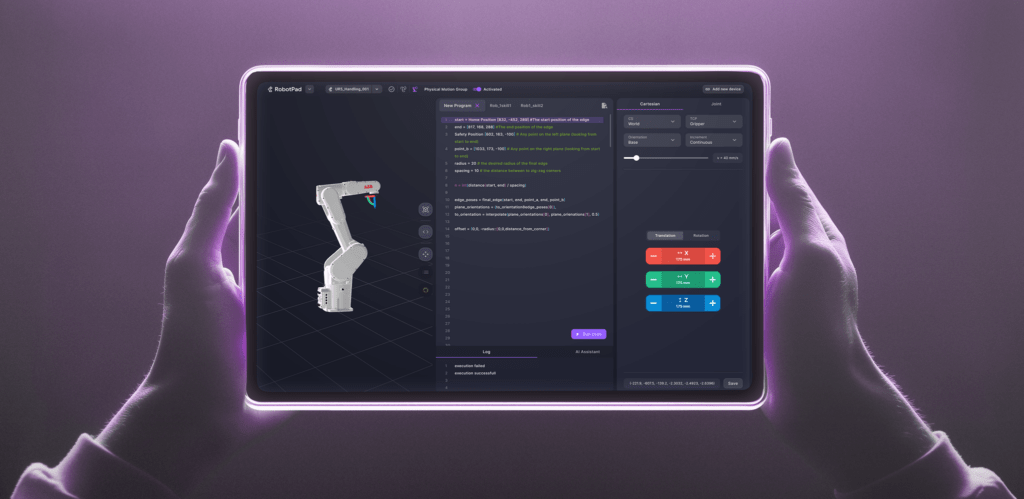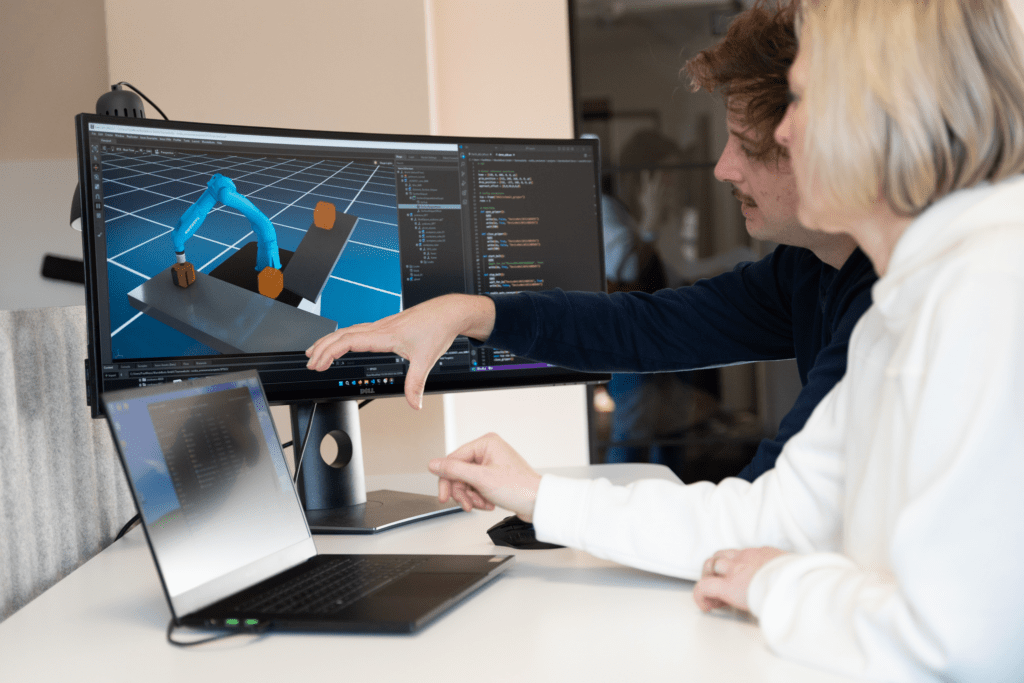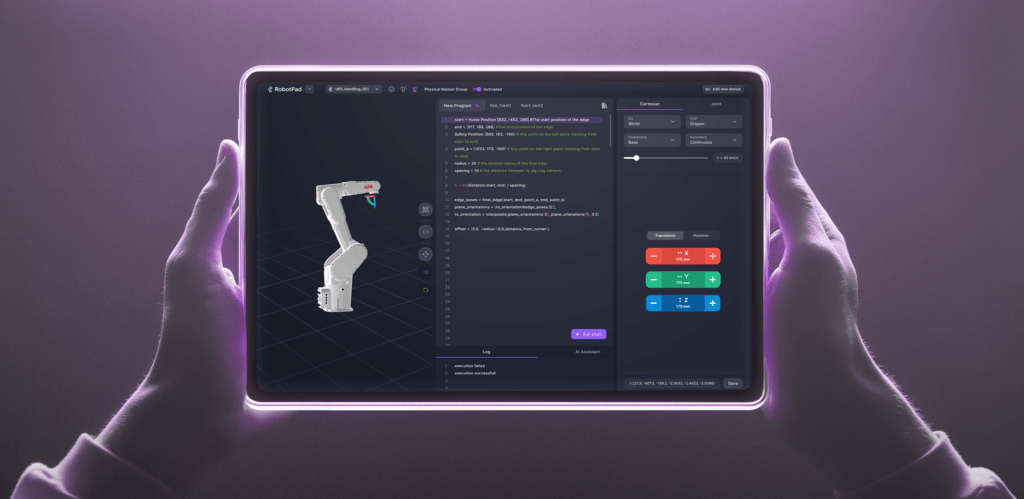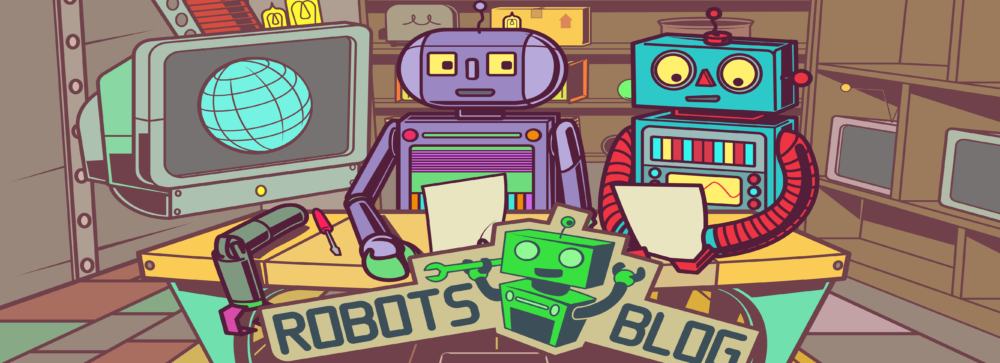Dresden, November 6th, 2024 – Last night at its exclusive launch event in Dresden, Wandelbots unveiled the world’s first agnostic operating system specifically developed for industrial robotic automation. With NOVA, a new era of automation begins, setting new standards in efficiency, accessibility, and innovation.

„With NOVA, we are witnessing a new dawn in industrial automation,“ said Christian Piechnick, CEO of Wandelbots. „Just as Android revolutionized smartphones and Windows transformed the PC world, NOVA will make industrial robotics accessible to everyone and create new ways for software developers to commercialize.“
Carl Doeksen, Global Robotics / Automation Director for Abrasive Systems at 3M states: „At 3M, we collaborate with startups, to augment our innovation model. We’re proud to be part of Wandelbots‘ journey to democratize robotics. Today, the vast majority of the abrasive applications are still done manually. Wandelbots NOVA will lower the barrier for companies to automate these types of processes. With NOVA, users are empowered with the process know-how they need to select the right abrasive materials; they can easily input the parameters for their workpiece and specify the desired final state using a simple UI. For 3M, NOVA provides an opportunity—not only to equip end-users with the tools they need, but to make our extensive expertise in process technology more accessible.“
Modern Programming Languages and Vendor Independence
Wandelbots NOVA is the world’s first agnostic operating system for robots, designed to make robotics accessible to everyone. By supporting modern development tools like Python and JavaScript, NOVA empowers millions of developers to create and scale robotic applications with ease, reducing the complexity of automation. Following a Plan, Build, and Operate approach, NOVA simplifies the entire automation lifecycle with AI technologies at its core—from planning and simulation to deployment and scaling—ensuring continuous support throughout each phase. Its seamless integration with existing hardware allows businesses to leverage past investments while scaling across multiple robots and brands, without costly retooling—accelerating projects, lowering costs, and increasing flexibility. Wandelbots’ close collaboration with Microsoft and OpenAI ensures scalability and that the latest and greatest AI capabilities enhance NOVA’s feature set.

As a vendor-independent operating system, NOVA simplifies and optimizes the complex world of industrial robotics by integrating hardware components from various manufacturers and making them accessible to everyone using through a modern interface. Complex programming and inflexible automation landscapes are now things of the past. NOVA’s open API concept, unique user experience, and seamless integration of externally developed apps make it a versatile platform for both robot users and millions of software developers.
Proprietary and outdated programming languages, high operating costs, a lack of skilled labor, and closed ecosystems have so far prevented the full realization of robotics‘ enormous potential—especially in small- and medium-sized enterprises, where robotics is still a niche topic. NOVA, as a unified operating system, will significantly advance robotics by enabling easy programming and control of robots from different manufacturers without the need for specialized expertise. This reduces operating costs, speeds up innovation processes, and eliminates the dependence on hard-to-find skilled personnel. Especially for SMEs, where the current level of automation is still in the single digits, NOVA opens up entirely new perspectives.
An Open Ecosystem for Software Developers
Wandelbots NOVA is much more than just an operating system. It offers a unified user interface for all robot manufacturers and models. Software developers can access development tools, UI elements, standardized libraries, and sample applications through the dedicated developer portal. Using the Python-based programming language „Wandelscript,“ they can create innovative solutions for interacting with robots and share their experiences within the community specifically created for this purpose.
A New Era of Automation
The launch of NOVA marks a turning point. It opens up new opportunities for companies to leverage automation. In addition, software developers, who currently create apps or websites, can now unleash their creativity in a completely new industry.

How NOVA Supports Companies
Wandelbots NOVA was developed with four key objectives to support companies:
- Support revenue growth: Automate processes faster and more reliably.
- Optimize Operations: Manage the entire robotics automation process through a single platform and reduce the complexity of shop floor IT.
- Reduce costs and risks: Virtual planning, commissioning, and support of automation systems lower the barrier to entry and the risk of unnecessary investments.
- Improved Usability: Automation projects with user-friendly frontend applications enable easy interaction between employees and robots.
Addressing the Labor Shortage and Simplifying Robotics
One major advantage of NOVA is its ability to counter the growing shortage of skilled robot programmers and production workers. Through intuitive frontend applications and a unified user interface, NOVA makes it easier than ever for employees to interact with robots without requiring technical knowledge. A modern and unified programming language also opens up a completely new field of activity for millions of software developers, thus strengthening the industry’s innovative capacity.
Investment Protection Thanks to Realistic Simulation with Digital Twins
Future automation systems can be tested for functionality before costly hardware equipment is purchased. The integration of Wandelbots NOVA with the NVIDIA Omniverse platform empowers developers and operators to create physically accurate digital twins of robots, factories, and movable workpieces for simulation before real-world deployment. This seamless integration delivers consistency between the digital twin and the physical automation cell throughout their entire lifecycle, which can enhance efficiency and reduce potential errors.
Wandelbots NOVA – Beta Phase Starts Now
Since June, the first approximately 50 customers have been able to experience the advantages of Wandelbots NOVA in the closed beta phase. Now, Wandelbots is making its operating system available to more users in the open beta phase. Interested users can register at https://www.wandelbots.com/developers-beta
Learn More at the SPS Trade Fair
We warmly invite you to see NOVA yourself and test it live at the SPS from November 12th to 14th: https://www.wandelbots.com/sps You can find us in Hall 6, Stand 248. Feel free to contact us at [email protected] to schedule an appointment. We are also happy to be available for interviews on-site.
In short:
- NOVA enables programming and controlling robots independent of the vendor
- NOVA brings robotics out of the niche and makes it accessible to the masses
- Software developers can easily create their own robotics applications
- NOVA, in combination with NVIDIA Omniverse, enables simulation and planning with digital twins
- Strong collaboration with Microsoft ensures scalability and cutting-edge AI features
- Interested companies and developers can sign up for the beta phase

